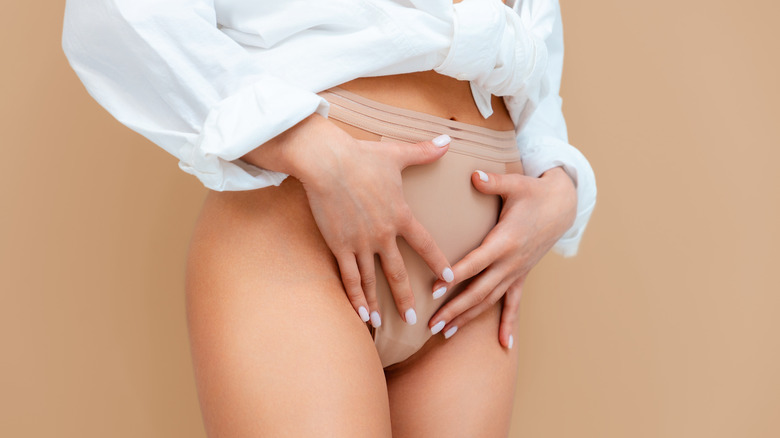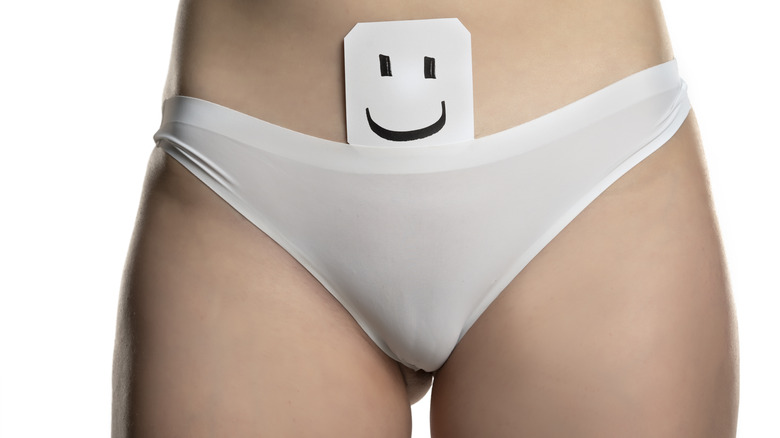Why Vajacials Can Be An Empowering Form Of Self-Care And How To Do One At Home
The word "vagina" is undoubtedly vilified. Although it should be considered a perfectly normal topic of discussion, vaginas, unfortunately, have a negative connotation. Moreover, sex education and anatomy are rarely taught in schools. However, this is nothing new and goes back centuries of oppression and misinformation about women and their genitalia. This is especially true regarding ideas of what the "perfect" vagina should look like as portrayed in the media and society. Ultimately, this has resulted in confusion and even shame in women. In other cases, it's prevented women from properly learning about their vaginas.
Registered nurse Bri Durkin explained to Real Simple the downside of this and the solution. She said, "Stigma around these topics creates a sense of embarrassment for women when it comes to addressing their health issues. If we are able to normalize these topics as a society, the easier it will be for people who struggle with any issues to feel empowered about their own bodies and feel comfortable getting help." The truth of the matter is every vagina is different and has different needs. Vajacials, a facial for your vagina, aims to educate women and help them reclaim their vaginas.
Vajacial focus more on health than appearance
In a few words, vajacials can be described as skincare for your vulva, emphasizing the bikini line and outer labia. If you get this treatment done professionally, it can include steaming, extractions of ingrown hairs, exfoliation, and a mask. On average, vajacials last for 50 minutes and can cost a few hundred dollars. Having said that, vajacials are not about improving aesthetics; the focus is enhancing your vagina's health. In fact, they are recommended as post-shaving or post-wax care because they can prevent irritation and other discomforts. Likewise, it can stave off acne, ingrown hairs, and remove dead skin cells.
Another benefit? vajacials can help individuals manage specific skin issues and address skin concerns. They hydrate the skin and can improve discoloration. If you can't afford a professional vajacial or don't feel comfortable getting one, you can do one at home as a way to practice self-care. First, cleanse your vulva with a feminine wash of your choice. Then, groom or remove hair before using a vulva-friendly scrub to exfoliate. Once you've completed these steps, look in the mirror to check for ingrown hairs or other concerns you may want to address with your doctor. Lastly, hydrate! Use a moisturizer, oil, or a mask to complete your vajacial.
Vajacials normalize conversations about vaginas
While the evolution of the body positivity movement has focused on accepting your body as it is, vaginas have not been included in this trend. Vajacials can change this by opening non-sexual discussions on vaginas and vaginal health. Cindy Bishop, the founder of VSPOT Medical Spa, explained to Real Simple that vajacials are a game changer for destigmatization. She said, "I hope the trend of intimate health awareness becomes more than a conversation because it has empowered women to accomplish their wellness goals." However, other experts note that vajacials aren't physically necessary but are nonetheless a great way to incorporate self-care into your life.
Dermatologist Tiffany Clay, MD, told Refinery29 that if you get a professional vajacial, speak up about any concerns. She said, "It's such a sensitive area of the body and you definitely want to make sure that you're comfortable with the person doing it. If at any point you feel uncomfortable, feel free to ask them to stop."
In an article for Bustle, writer Sebastian Zulch notes that by incorporating vajacials into our skincare routine, we can learn more about our vaginas and how to love them. Zulch compares getting a vajacial to any other skin care treatment done more for its body-positivity benefits than its beautifying aspects. Nevertheless, vajacials, whether done professionally or at home, can help you feel your best because you're taking the time and effort to care for a part of your body that you haven't before out of fear or shame.


